|
|
|
Sort Order |
|
|
|
Items / Page
|
|
|
|
|
|
|
| Srl | Item |
| 1 |
ID:
178108
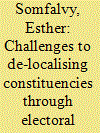

|
|
|
|
|
| Summary/Abstract |
Kazakhstan and Kyrgyzstan introduced a single-district closed-list proportional electoral system in 2007. Despite similar rules, the relationship between MPs and their constituencies differs: while the reform fostered nationwide representation in Kazakhstan, Kyrgyzstan’s MPs maintained a local, personalised representation style. This article explores how similar electoral rules lead to divergent outcomes under diverse party systems. Based on legal documents and 25 original interviews, the article provides two in-depth accounts of how electoral rules interacted with institutional counterincentives to guide the representative behaviour of MPs. The analysis covers the effects on MPs’ re-election strategies and the organisation of constituency service within factions.
|
|
|
|
|
|
|
|
|
|
|
|
|
|
|
|
| 2 |
ID:
157481
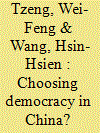

|
|
|
|
|
| Summary/Abstract |
We argue that the choice of electoral rules in Chinese villages results from the incentives that rural party elites face in their efforts to control electoral results. Using the rationalist approach, we propose four conditions under which they will adopt an institution that allows for electoral uncertainty: a large proportion of revenue from village-owned enterprises (VOEs), a large size of electorate, the presence of strong social groups, and frequent upper level government interventions. We use the 2011 Wukan incident to illustrate our argument. The cross-sectional analysis of survey data of 961 villages provides some evidence for the hypotheses: A larger number of labor force and frequent inspections by the upper-level government are significantly correlated with an increase of the likelihood that a village party leader allows villagers to freely nominate candidates. Theoretical and policy implications will be discussed in the end of this paper.
|
|
|
|
|
|
|
|
|
|
|
|
|
|
|
|
| 3 |
ID:
101387
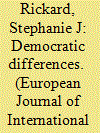

|
|
|
|
|
| Publication |
2010.
|
| Summary/Abstract |
A growing body of literature argues that democracies are more likely to comply with international agreements than authoritarian states. However, substantial variation exists in the compliance behaviour of democracies. How can this variation be explained? The same mechanism that links regime type to compliance, namely electoral competition, also explains variation in compliance among democracies. This is because the nature of electoral competition varies across democratic systems. An analysis of democratic GATT/WTO member countries from 1980 to 2003 reveals that governments elected via majoritarian electoral rules and/or single-member districts are more likely to violate GATT/WTO agreements than those elected via proportional electoral rules and/or multi-member districts.
|
|
|
|
|
|
|
|
|
|
|
|
|
|
|
|
| 4 |
ID:
148654


|
|
|
|
|
| Summary/Abstract |
We argue that state legislative politics is qualitatively different from national congressional politics in the extent to which it focuses on localized and geographically specific legislation salient to subconstituencies within a legislative district. Whereas congressional politics focuses on casework benefits for individual constituents, state legislative politics is more oriented to the delivery of localized benefits for groups of citizens in specific areas within a district, fostering a geographically specific group connection. A primary way to build such targeted geographical support is for members to introduce particularistic legislation designed to aid their specific targeted geographical area within the district. We argue that this is primarily a function of electoral rules. Using original sponsorship data from U.S. state houses, we demonstrate that greater district magnitude and more inclusive selection procedures such as open primaries are associated with more particularism. Our findings provide strong support for a voter-group alignment model of electoral politics distinct from the personal vote/electoral connection model that characterizes U.S. congressional politics and is more akin to patterns of geographically specific group-oriented electoral politics found in Europe and throughout the world.
|
|
|
|
|
|
|
|
|
|
|
|
|
|
|
|
| 5 |
ID:
170019
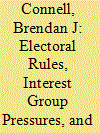

|
|
|
|
|
| Summary/Abstract |
Conventional wisdom dictates that democracies are reliable in upholding their international commitments. However, this assertion is at odds with democratic behavior in sovereign borrowing where democracies have sometimes imposed considerable losses on foreign creditors. Why do some democracies choose to renege on extremely large portions of their sovereign debt during economic crisis? This article argues that costs incurred by creditors are dependent on how the borrowing state's electoral system aggregates competing domestic economic interests. Internationally oriented economic interests prefer to minimize creditor losses since sizeable debt reductions are more likely to compromise access to foreign credit. Conversely, workers and domestic-oriented economic interests prefer to maximize losses faced by foreign creditors in order to ease the costs of austerity at home. By shaping the political incentives of policymakers, I argue that democracies with candidate-centric electoral systems should be associated with sovereign defaults that are less costly for foreign creditors. Under these electoral systems, governments hold incentives to cater primarily to internationally oriented economic interests that are best able to overcome the costs of collective action. Statistical evidence from 53 sovereign debt restructurings between 1978 and 2012 supports the main argument.
|
|
|
|
|
|
|
|
|
|
|
|
|
|
|
|
| 6 |
ID:
171203


|
|
|
|
|
| Summary/Abstract |
What explains the passage of Thailand's landmark universal healthcare (UHC) policy? In separate contributions, Selway and Harris emphasized the role of electoral rules and political parties, on one hand, and “professional movements” of developmentally minded state bureaucrats on the other. Which is correct? In this article, Selway and Harris respond to each other's work. While Selway agrees that the actions of the professional movement constitute an underappreciated necessary condition for universal healthcare in Thailand, he argues that Harris overstates the role of the movement in implementation. Harris defends his position and maintains that an institution-focused account is insufficient, arguing that the actions of Thailand's Rural Doctors’ Movement not only explain universal healthcare but also gave rise to the very electoral rule changes that Selway argues were so critical to facilitating universal coverage. Selway responds to these criticisms, and the two researchers jointly consider implications for causation, qualitative research, and policymaking theory.
|
|
|
|
|
|
|
|
|
|
|
|
|
|
|
|
| 7 |
ID:
190037
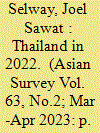

|
|
|
|
|
| Summary/Abstract |
Thailand’s military-aligned government saw its popularity plummet in polls throughout 2022. Yet former head of the armed forces and current prime minister Prayut Chan-o-cha was resilient in the face of mass party defections, a falling-out with his fellow party leader and long-time friend Prawit Wongsuwon, a censure debate, and even a constitutional court case threatening to remove him from office. The mass street protests that were a constant feature of the previous three years evaporated as conservative forces used the controversial Section 112 Royal Defamation Law to silence the various movements’ leaders. Political attention was focused on the impending elections, which shook up the party system with rampant party mergers and switching. Meanwhile a return to the 2011 electoral rules fueled talk of another Pheu Thai landslide in the next elections. The economy began to improve with the relaxing of COVID rules and the return of tourism, throwing a lifeline to a rapidly sinking Prayut, who himself switched to a new political party before the year’s end.
|
|
|
|
|
|
|
|
|
|
|
|
|
|
|
|
| 8 |
ID:
117195
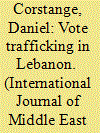

|
|
|
|
|
| Publication |
2012.
|
| Summary/Abstract |
Vote buying and vote selling are prominent features of electoral politics in Lebanon. This article investigates how vote trafficking works in Lebanese elections and examines how electoral rules and practices contribute to wide and lively vote markets. Using original survey data from the 2009 parliamentary elections, it studies vote selling with a list experiment, a question technique designed to elicit truthful answers to sensitive questions. The data show that over half of the Lebanese sold their votes in 2009. Moreover, once we come to grips with the sensitivity of the topic, the data show that members of all sectarian communities and political alliances sold their votes at similar rates.
|
|
|
|
|
|
|
|
|
|
|
|
|
|
|
|
|
|
|
|
|